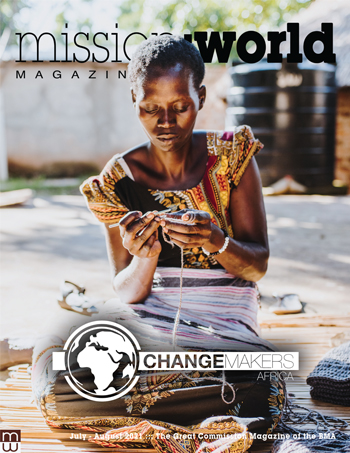The BMA’s Ministry History in Africa
BY: Dr. John David Smith
BMA Missions
bmamissions.org

edition of mission:world!
Africa is known as “the dark continent,” so titled by author Henry Stanley not because of its inhabitants or socioeconomic status, but because of the mystery it remains for Europeans and Westerners. Let’s be honest, for many in the West the closest we have come to Africa is Disney’s The Lion King. However, before we discount that as juvenile and of no value, let’s look at some of the real lessons it teaches about Africa. The opening scene of the rising sun accompanied by the Zulu chant that is translated in the famous song, “Circle of Life” captures our attention quickly. The animals on the Savannah are at full attention as Mufasa the King presents his newborn son Simba on Pride Rock. The Circle of Life is the thrust of the movie. In the positive it represents the ways things “should” be and the respect that is required for authority, family, caring for others, and seeing ourselves as part of the big picture…not being the big picture. In the negative (not seen in the movie) it no doubt also can lead to an extreme reverence for and worship of nature. The movie does not portray God; instead, it depicts the spirit-man (in this case a monkey) as in charge of the process. The more in-depth extremes of this would include ancestor worship, witchcraft, and various forms of animism.
Later in the movie, we are introduced to two of the most likeable characters in Timon and Pumbaa. They live by the mantra of Hakuna Matata…no worries. After a life-threatening experience, they are taken back to the Circle of Life. In the end, after Simba is misled, he also returns to living the Circle of Life. A summary of some of the lessons we know about African culture in contrast to Western culture would include the following: they are very group oriented while we are individualistic; there is a great respect for “oughtness,” the way things should be, while we celebrate self-identity; Africans tend to be relational while we are achievement oriented; and they value the event and the experience while we are governed by strict adherence to time.
When did the gospel first go to Africa? Remember, young Jesus and His family fled to Egypt. Simon of Cyrene carried the cross of Jesus. Cyrene is modern-day Libya. On the Day of Pentecost there were people from Egypt and Cyrene present. Philip led the Ethiopian eunuch to Christ. Believers from Cyprus and Cyrene first preached the gospel to the gentiles in Antioch of Syria. Throughout the first centuries of Christianity, northern Africa was a fertile ground for Christianity… (Click the image above to continue reading this article)
